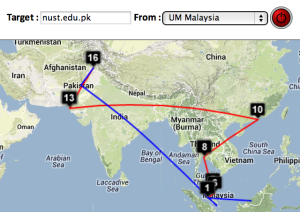Introduction
Visual Traceroute is a new feature that can be accessed by calling reflector.cgi with function=vtrace. Currently it can provide visual traceroute from 5 PingER monitors:
- www-wanmon.slac.stanford.edu
- pinger.cern.ch
- maggie1.seecs.edu.pk
- mel-a-ext1.aarnet.net.au
- pinger.fsksm.utm.my
It works by first finding the traceroute to the target using the traceroute.pl installed at the monitoring node and then geolocating each on the intermediate hops using TULIP. It can be accessed from http://tulip.slac.stanford.edu
Performance
Normally it would take about 10 mins to perform a complete visual traceroute but we have incorporate caching to speed up the process. Currently about 2000 router locations are cached in /nfs/slac/g/net/pinger/tulip/cachetr/cache.txt
Whenever the location of a new router is found it is automatically add to the cache, hence the cache is updated dynamically. If the location of all the routers in the requested vtrace are cached then it takes only about 10 secs to give the output.
Design
Two paths of traceroute are shown on google maps, one (shown in red) is drawn using TULIP and the other (shown in blue) is drawn using MaxMind (an IP host location database). The hops are shown as appropriate numbered markers. See the figure below:
This figure shows the traceroute from SLAC to NUST Pakistan. http://www-wanmon.slac.stanford.edu/cgi-wrap/reflector.cgi?function=vtrace&target=nust.edu.pk
Examples
This presentation was sent to Harvey.
| University of Malaya, Kuala Lumpur to NUST Islamabad | |||
|---|---|---|---|
University of Malaya to NUST, Islamabad.

